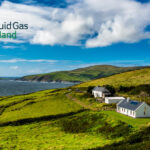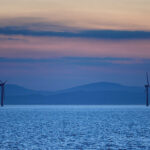
New Liquid Gas Ireland Report ‘The role of liquid gas in providing accessible lower carbon heating for Irish homes’
5th June 2024
Four south coast offshore areas proposed
3rd October 2024We must produce more energy here in Ireland

Despite progress made on renewable electricity, mainly from wind power, Ireland remains highly dependent on imported fossil fuels to satisfy our needs for heating our homes, fuelling our cars and trucks, and powering our homes, writes Paul Deane, senior lecturer in clean energy futures at MaREI.
In 2023, 83 per cent of Ireland’s energy requirement was met by fossil fuels, most of this in the form of imported oil from the UK, the USA, and Azerbaijan as well as imported natural gas from the UK and Norway.
This energy comes at a high cost; we spend about €1 million an hour on energy in Ireland.
Our energy prices are also highly volatile and influenced by global geopolitics, regional weather, and wars. All of these happen beyond our borders and are beyond the control of the Government.
As we look to the future, the energy landscape on which Ireland relies so heavily is looking increasingly more fragile, less secure, and more volatile.
To protect our economy against this volatility, we must produce more energy here in Ireland.
While we use huge amounts of fossil fuels in Ireland, we do not have a rich fossil fuel resource.
Over the past 40 years, we have drilled 161 wells in Irish offshore waters looking for oil and gas; there have been four commercial gas discoveries and no commercial discoveries of oil.
While we do not have commercially available fuel under the ground, we have it in abundance over the ground in terms of wind and solar which can be used to make electricity, and this electricity can also be used to replace the traditional uses of oil and gas for transport and heating.
But the move away from fossil fuels will take both time (at least two decades) and significant investment.
It is not correct to think that a transition away from fossil fuels will be cheap or easy. It will not, but if managed correctly it can be affordable and worthwhile.
Investment is required to build infrastructure like bus and cycle lanes and energy saving projects such as insulating homes and offices.
Investment is also required to generate more electricity and move this electricity around the country through a bigger electricity network to replace the oil trucks that today move oil and gas pipelines that today move gas.
The context for this investment is important because it is the additional cost over and above what we are spending already that matters.
Maintaining our current fossil fuel reliance costs about €10 billion per annum.
If this money is redirected to clean energy, then the additional investment required to move away from fossil fuels is between 1 per cent and 2 per cent of gross domestic product (GDP) per year.
While this is significant, it is manageable and does not consider worthwhile benefits such as more employment, better health from less pollution, or social benefits from healthier transport options.
While such a transition is possible with existing technologies and know-how today, it is important to be honest about the challenges.
Increased energy production in Ireland, means more energy infrastructure in terms of wind farms, solar farms, and electricity pylons to move power around.
This infrastructure will be considered ugly and unwelcome in many places and it will not always be easy to deliver but it is necessary for delivering more secure energy.
The challenge for Ireland is to work with communities to deliver infrastructure in an acceptable and agile manner.
In a world that is more geopolitically fragile and less energy secure, our reliance on fossil fuel leaves Ireland exposed to the actions of other nations and when we consider the abundant secure alternatives we have in Ireland, this reliance is starting to look increasingly reckless.
